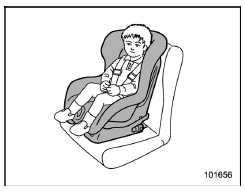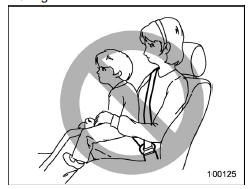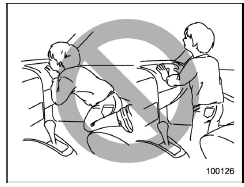Subaru Crosstrek Owners Manual: Child restraint systems

Infants and small children should always be placed in an infant or child restraint system in the rear seat while riding in the vehicle. You should use an infant or child restraint system that meets Federal Motor Vehicle Safety Standards or Canada Motor Vehicle Safety Standards, is compatible with your vehicle and is appropriate for the child's age and size. All child restraint systems are designed to be secured in vehicle seats by lap belts or the lap belt portion of a lap/shoulder belt (except those described in "Installation of child restraint systems by use of lower and tether anchorages (LATCH)" 1-33).
Children could be endangered in an accident if their child restraints are not properly secured in the vehicle. When installing the child restraint system, carefully follow the manufacturer's instructions.
According to accident statistics, children are safer when properly restrained in the rear seating positions than in the front seating positions.
All U.S. states and Canadian provinces require that infants and small children be restrained in an approved child restraint system at all times while the vehicle is moving.

WARNING
Never let a passenger hold a child on his or her lap or in his or her arms while the vehicle is moving.
The passenger cannot protect the child from injury in a collision, because the child will be caught between the passenger and objects inside the vehicle.
Additionally, holding a child in your lap or arms in the front seat exposes that child to another serious danger.
Since the SRS airbag deploys with considerable speed and force, the child could be injured or even killed.

WARNING
Children should be properly restrained at all times. Never allow a child to stand up, or to kneel on any seat. Unrestrained children will be thrown forward during sudden stop or in an accident and can be injured seriously.
Additionally, children standing up or kneeling on or in front of the front seat are exposed another serious danger. Since the SRS airbag deploys with considerable speed and force, the child could be injured or even killed.
- Where to place a child restraint system
- Choosing a child restraint system
- Installing child restraint systems with ALR/ELR seatbelt
- Installing a booster seat
- Installation of child restraint systems by use of lower and tether anchorages (LATCH)
- Top tether anchorages
 Precautions against vehicle modification
Precautions against vehicle modification
Always consult your SUBARU dealer if
you want to install any accessory parts to
your vehicle.
CAUTION
Do not perform any of the following
modifications. Such modifications
can interfere with pro ...
 Where to place a child restraint system
Where to place a child restraint system
The following are SUBARU's recommendations
on where to place a child restraint
system in your vehicle.
A: Front passenger's seat
You should not install a child restraint
system (including a b ...
Other materials:
Removal
CONTINUOUSLY VARIABLE TRANSMISSION(TR580) > Oil Pan and StrainerREMOVALCAUTION:• Directly after the vehicle has been running or the engine has been idling for a long time, the CVTF is hot. Be careful not to burn yourself.• Be careful not to spill CVTF on the exhaust pipe to prevent it ...
Caution
EyeSight > General DescriptionCAUTION• Before disconnecting connectors of sensors or units, be sure to disconnect the ground cable from battery. When replacing the electrical parts provided with memory functions that store contents specified by a customer, record the memory contents before ...
By contacts list
On the phone (menu) screen, select the
"Contacts" key to open the phone number
list screen.
You can make a call by selecting an item
in the list (up to five phone numbers are
listed).
If there is no contact data, a message is
displayed to indicate that there is no contact data.
Conta ...
